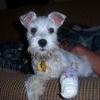Search the Community
Showing results for 'Yogurt'.
Found 17,501 results
-
Hi all. I had GB on 1-18 and just started puréed foods. I didn't get a sample diet, just a list of foods to eat: Baby food, cottage cheese, yogurt etc. don't even know when to drink Protein shakes in between all this. I can only see my nut 3x a year, and haven't even seen her since I had my surgery. I tried to see her the day of my 1 week check up, but was told that I could not because they wouldn't be able to bill insurance for it because it was same day as doctor visit. Can anyone give me a sample diet or some advice in what you are doing during the puréed stage? I was only told by doctor to get in about 60g protein. I almost feel like I was just discarded now that I had the surgery. Thanks!! Sent from my iPhone using the BariatricPal App
-


How In The World Do I Get 1100 Calories Into 1 Day?
silly_weasel replied to radarluv's topic in POST-Operation Weight Loss Surgery Q&A
I was eating soups, yogurt, and oatmeal 10 days post op. You can still drink occasional protein shake, just to get your protein in, which helps with the healing process. -


My first post....Surgery Jan 6th
BetsyB0101 replied to animated_angel's topic in Tell Your Weight Loss Surgery Story
Today is day 3 post surgery. I got to start full liquids! Yay! Had yogurt for breakfast, about 2 oz protein shake for lunch and some really yummy potato soup that I put thru the blender for dinner. I have pain in my left side, which I understand is normal. My BP was a little high this morning, but my meds got changed after the surgery and I doubt they are in my system good. All in all, I think I am doing pretty good. I haven't gotten all my fluids in today. The eating in between has thrown me off. I will concentrate on liquids this evening and do better tomorrow. When does the weight loss start? Lol! I know I am not eating much and just seems the scale would start moving a little! -


Sleeved On April 24Th
Carole65 replied to juliette669's topic in Tell Your Weight Loss Surgery Story
Hi, first off cottage to you, and your new life that is waiting just around the corner!!! My name is Carole, I had my sleeve done on October 20, 2011! In a little over 6 months I have lost almost 110 lbs! I went from a size 24 to a 12 and now the 12 is starting to get big! Everything is just happening so fast! I tried the protein shakes, but I thought they were vile!!! If you can tolerate them, then that is great, and keep drinking! My surgeon said as long as I could eat yogurt, which I could than I didn't have to worry about the protein. My protein is still a little low as are some of my vitamin levels. So please take your vitamins!! My heaviest I was 306 now I am into the 190's. I feel so much better. I had a rough surgery, the day after I had a heart attack, was intubated for 3 days awake... HORRIBLE.... Went back into surgery 2 days after the first surgery cause I was losing so much blood, need 6 transfusions. Then my spleen was bleeding into itself, I know that sounds strange, but your spleen has an outer capsule. So I spent 11 fun filled days in the hospital. People ask me if it was worth it?...... I say yes every time! My life was going nowhere. Now I'll be able to do all the things I couldn't! Even at 46 I am going back to school! And start my life. You can talk to me ask me questions feel free, I know what you are going through! Just hang in there! Take care, Carole -


Real Talk, Real Food...
Almostthere34 replied to elektrik_rose's topic in Tell Your Weight Loss Surgery Story
Hi Ashley, Not on a liquid diet but did the same thing had surgery June 15th. I had to cook for my husband and kids before and after the surgery. It wasn't as bad as I expected. Of course I didn't make any of my favorites. I pretty much did meatloaf, chicken, fish, pasta's with salad and a carb. Most were my normal weak night meals. I had one night stay in the hospital and no gas pains so I was very fortunate. Don't forget it's ok to make sandwiches some nights. My kids kept eating my Jello and yogurts. :-) You will do fine. I just want to wish you a speedy recovery. Kina -
It's 10:30 pm and I am feeling very hungry. What is acceptable to have this late? I am eating a couple oz of Greek yogurt. Any thoughts?
-


Anyone Get Sick Close To Surgery Date?
Sojourner replied to BeeBlueHeron's topic in PRE-Operation Weight Loss Surgery Q&A
It's best to begin to focus on adjusting your eating patterns now to those you will need to comply with post op. Dry toast of any description/content and crackers are prime culprits for precipitating stuck episodes post op. I definitely understand the limitations of taking medications on an empty stomach; I don't tolerate that well. What you want to do is to coat the lining of your stomach. Though I understand that dairy products may increase the production of mucus in your body, and are not the best choice now, in the future consider drinking some 1% milk or eating SF very low fat yogurt when taking your meds will be helpful. I'd try some no sugar added natural applesauce to take along with your medications. You can even take the meds with your Protein shakes. But stay away from the dry wheat products; they are not your friends post op. -
Okay, still struggling. I am on the 5th type of Protein shake, still making me gag. I have about 5 glasses of tea a day, that maybe equals 40oz or so. But I am getting in 0 protein. In desperation today I bought yogurt, even though I can't stand it. I am going to email my dietician tomorrow. I just don't want to wither away. In about 10 days ill be able to eat soft foods and I am hoping that will help with my protein intake. I feel like I am being a bad surgery patient!
-


Healthy traveling snacks
BetsyB replied to samomom's topic in POST-Operation Weight Loss Surgery Q&A
Labrada Rock 'n Roll nutty peanut bars are good--and pack a good Protein punch (20 g/bar, I think; I can only eat half a bar at a time) Nuts are a good choice--low carb, though more of a fat than a protein I think you'll probably find it pretty easy to find "safe" Snacks on the go---I'd pack a pouch of PURE unflavored protein to stir into things like yogurt, which you can pick up in any concession place or corner store. -
Surgery day, Surgery was a breeze, I was out before I even knew I went into surgery. However, after I could'nt wake up from the anesthesia. I went to the bathroom asleep, did the barium swallow asleep and my dr. requires you to drink a bottle of water before leaving. I slept through that too. I would take a sip, fall asleep, then wake up, take a sip, fall asleep. I have no idea how long it took me to drink that water. Food on surgery day: 2 1/2 cups of creamy broccoli soup that I found in the organic section(this is the yummiest soup I have had in a long time) small sips of crystal light lemonade small sips of water all day Day 2, This was my most painful day so far The general anesthesia wore off and It was miserable all day. The pain wasn't unbearable, just miserable. I took more than the recommended dosage of the pain meds I think. I look 7 months pregnant. It's kind of cute because for medical reasons I can't have any more children. So I found it adorable that I looked 7 months pregnant for a day. My mom took me for my walk. I held my belly as if I was pregnant and got a few smiles from people. It hurt the most to get up and down from the chair and on and off the bed. I was really hungry all day today. I recognize my full feeling from reading this forum, however if I hadn't have known what to expect, I would have kept eating not realizing my limitations. I had a LOT of gas this day, but not in my shoulder like other people complained about. I would burp about once an hour and it would come from way down the bottom of my stomach and resonate all the way up. He He, by far the loudest and longest burps I have ever done. Food day 2: container of yogurt for breakfast, couldnt finish it all before I got full. no salt added butternut squash soup for lunch, found it in the organic section. (it was sooo yummy but not as good as the creamy broccoli, LOL) Dinner I had what was left of the creamy broccoli soup. It wasn't quite a full serving, so I had a feeling I would be hungry later. evening snack: I only had this because I felt excruciatingly hungry. I made a 3/4 of low sodium chicken broth. I put a bit of mrs. dash in it and heated it in a coffee cup. I sipped it like it was a warm cup of tea on a cold day. I wasnt able to finish it all before I felt full Day 3 I slept 18 hours straight. I haven't done that in a LONG time. I woke up this afternoon and a good bit of my sweeling has gone down. and the pain isn't nearly as bad as it was yesterday. I haven't even taken my pain meds yet and I seem fine so far. For Breakfast: I am having a yogurt cup that I put a half of scoop of unjury powder in and mixed. It does change the flavor, but I guess its ok for now. Dinner: homemade egg salad with 2 eggs, fat free mayo, dill relish and a dash of mustard. I ate about 2/3's of it. Dinner: 1/2 butternut squash soup, but could only eat 1/4 cup. Evening snack: low sodium V-8
-
bariatric foodie has some easy recipe. I highly recommend ricotta bake (google "eggface ricotta bake") - super easy and tasty. Sometimes I add some sauteed spinach or a spoon of pesto. If you like shrimp, it is super easy and tasty. Defrost a few, add a bit of oil or butter to a pan over medium heat, and saute for a few minutes until they're pink. You can add some spices. I like cajun seasoning (if you can deal with heat), or italian seasoning. Added: this is super easy, don't even need to defrost the fish: https://www.bariatricfoodie.com/one-pan-cooking-tilapia-fire-roasted-tomato-sauce/ But, one fish fillet will serve me three times, and I don't eat thawed fish more than two days after it thaws, so I often have to toss some fish. Also really like egg salad - just 2 hard boiled eggs, masked with either a bit of ripe avocado or 1 TBL mayo and 1 TBL greek yogurt.
-
Remember to walk, walk, walk and walk. Gas X and therma care heating pads for the shoulder help me. Also I brought plain greek yogurt to add to my soups. As a matter of fact I use greek yogurt in everything! Remember Protein Protein and Protein. You will do just fine. Good luck to you and welcome to the otherside!
-


Anyone got any advise for a soon-to-be bander??
tnt21705 replied to shutterbug6's topic in POST-Operation Weight Loss Surgery Q&A
All I got to say is gasX strips, hot tea, hot chicken broth,applesauce, and DanActive yogurt drinks. That's what I ate for the first two weeks. Follow the after surgery diet (don't jump ahead not matter how good you think you feel) Walk, walk , walk as much as comfortable after surgery to get the gas moving. Don't get discouraged if you feel terrible that first week. I did not feel better until my 9th or 10th day out. Everyday I feel better. Somedays my tummy feels good and some days not. On the days my tummy is bothering me I walk on the treadmill and that usually helps too. I find that I have gas in the tummy and it helps it work its way out. Hope this helps. -
So tomorrow i technically start mushies foods. Today i did very good around my wifes italian family i stuck with my yogurts and protein. Since i start mushies tomorrow i ate some ricotta cheese filling and sauce from the stuffed shells. It was delicious and made me feel like a real person again. I actually ate something valid. I know some of u are going to bash me because i did it a day early and maybe cheese wasnt the best way to go but if u were around that table today u would have seen it as a win as well. Merry christmas everyone!
-
I mix with plain Fage yogurt and dip apples or cucumber slices in it, or just eat eat. I've also mixed it with oatmeal and that was good for a treat.
-
if you were just banded on 9/16 you shouldn't even be trying to eat solid foods yet. I had mine on 09/17 and I'm on a full liquid diet for two weeks. Yogurts, strained cream soups, sugar free puddings, things like that. Your doctor should have told you not to try anything solid for awhile. Wait a few weeks and then try it again.
-
Cottage cheese with sweet chilli, or with chipotle. Bariatricpal soups - the variety pack is fantastic. Yogurt smoothies - the Internet is full of fantastic flavour options. Mostly for me, variety really mattered to keep me on track... Best of luck.
-


Banded Monday, Diet Questions
honk replied to pbmls223's topic in POST-Operation Weight Loss Surgery Q&A
I could have smooth soups like tomato, sweet red pepper, squash. I could not have yogurt until week 3. I did use a hand blender on the yogurt to mince up the fruit; and added milk since greek yogurt is really thick. Week 2 I was having yogurt so I had soup and protein shakes. When I moved to mushies I would have the soup wait an hour and have my protein. -
So, I was banded Monday and have been doing Clear liquids since. Tomorrow I can move to full liquids: Protein shakes, cream of whatever strained, yogurt. What was on your full liquid diet?
-
Yea i have been using sugar free chocolate pudding mix with unflavored poweder and pb2 ice and a little almond milk. Or i use sugar free frozen yogurt chocolate flavor with the above mentioned minus the ice.
-
I didn't eat noodles for the first two years after surgery and still can't eat very many of them or I have a similar reaction. I can't handle much rice at one time, either (not sure about rice noodles, though - I haven't had those since surgery). I think you're pushing your stomach too much. i was eating pretty "gentle" foods - like Greek yogurt - when I was where you are. I remember eating shrimp early on - but not sure at what point. I haven't eaten ground beef in probably 20 years, but I know I had issues with certain meats the first few months. I think most people can handle the ground variety, though. I'd just go way easier on your stomach...it takes awhile before you can eat a variety of food without issue.
-


Greek yogurt equals yum!
teacher replied to Linkinchik's topic in Tell Your Weight Loss Surgery Story
I am completely in love with Oikos Greek Yogurt but did not realize it had so much more sugar in it compared to Yoplait. I tried several different kinds when I started this journey and the texture of Oikos was what won me over. I just bought a box of Oikos at Sam's so I guess I will finish this and try Yoplait again. -


Greek yogurt equals yum!
No game replied to Linkinchik's topic in Tell Your Weight Loss Surgery Story
How did you go in for Fage and end up with yoplait?? I've been looking at the Fage website tonight and they have a couple of doable recipes.. This one for hummus looks good. I've been going and buying pre made Greek yogurt hummus but I might give this a try.. http://www.fageusa.com/plainkitchen/recipes/crushed-spicy-hummus-with-yogurt-spiced-baked-pita-chips/ -
I was @ the doctor's today for my final approval and there is an enormous amount of misinformation, between the doctor and the nurse. (Go figure). My surgery is Feb 7. Now they say I can add yogurt, but, one of them said limit dairy. I explained that the protein shakes I make are milk based. So, I am on info overload. Additionally, I was supposed to find no sodium broth, not low sodium. My friends/family that have already done this surgery provide much more info. than the hospital performing the procedure. Example: they have me scheduled for bariatric group on the day of my surgery. They make me nervous because I have to remind them of too many blunders.
-


Greek yogurt equals yum!
Pixie Dust replied to Linkinchik's topic in Tell Your Weight Loss Surgery Story
I don't mind the Greek yogurts but Chobani is the only brand I can't swallow. YUCKO! Glad you're enjoying it! Chobani is the only brand my son will eat in Greek yogurt...go figure?













